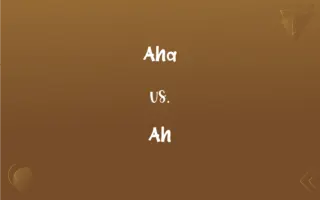Big vs. Great: What's the Difference?
Edited by Janet White || By Harlon Moss || Updated on November 16, 2023
Big typically refers to physical size or extent, while great often implies excellence, quality, or degree.

Key Differences
Big primarily describes the size, extent, or amount of something, often physically. It is used in a literal sense (e.g., a big house). Great, however, conveys a sense of quality, excellence, or intensity, and is used in both literal and figurative contexts (e.g., a great achievement).
Big is a more neutral term, describing physical dimensions or quantities without implying quality. Great carries an emotional or qualitative connotation, suggesting superiority or outstanding nature (e.g., great joy).
The word big can be applied to objects, people, or concepts where size is the primary focus. Great is more versatile, used for emotions, achievements, quality, and also in historical contexts (e.g., Alexander the Great).
In comparative forms, big becomes 'bigger,' focusing on size. Great becomes 'greater,' emphasizing an increase in quality or intensity.
Big has straightforward, tangible implications. Great, on the other hand, has been used historically to denote significance or eminence, often in titles or to describe eras or events.
ADVERTISEMENT
Comparison Chart
Primary Meaning
Physical size or extent.
Excellence, quality, or high degree.
Emotional Connotation
Neutral, factual.
Positive, implying superiority.
Usage
Literal, tangible aspects.
Both literal and figurative, broader scope.
Comparative Form
Bigger - larger in size.
Greater - higher in quality or degree.
Cultural Significance
Less culturally loaded.
Often denotes historical or cultural importance.
ADVERTISEMENT
Big and Great Definitions
Big
Significant in amount or degree.
She made a big decision.
Great
Remarkable in magnitude or significance.
It was a great victory.
Big
Enthusiastic or supportive.
They are big fans of jazz music.
Great
Skilled or adept.
He is great at solving puzzles.
Big
Famous or prominent.
He is a big actor in Hollywood.
Great
Of high quality or outstanding.
She is a great teacher.
Big
Large in size or extent.
He lives in a big house.
Great
Enthusiastic or keen.
They have a great interest in art.
Big
Older or mature, especially in reference to siblings.
My big sister is starting college.
Great
Historical importance or fame.
Alexander the Great was a renowned leader.
Big
Of considerable size, number, quantity, magnitude, or extent; large.
Great
Very large in size, extent, or intensity
A great pile of rubble.
A great storm.
Big
Having great strength or force
A big wind.
In a big rage.
Great
Of a larger size than other, similar forms
The great anteater.
Big
Of great significance; momentous
A big decision.
A big victory.
Great
Large in quantity or number
A great throng awaited us.
FAQs
Is 'big' always physical?
Mostly, but it can be used metaphorically (e.g., a big idea).
Is 'big' used in comparisons?
Yes, to compare size or extent (e.g., bigger than).
Can inanimate objects be described as 'great'?
Yes, if they are outstanding in quality or significance.
Does 'great' always mean something positive?
Generally, yes, but context can alter its connotation (e.g., great danger).
Can we use 'big' for non-physical concepts?
Yes, in metaphorical or exaggerated expressions.
Can 'big' and 'great' be used interchangeably?
Not always, as 'big' refers to size, while 'great' implies quality.
Does 'big' imply importance?
Not necessarily, it's more about size or extent.
Can 'great' refer to historical figures?
Yes, often to denote their importance (e.g., Catherine the Great).
Can 'great' be used in everyday conversation?
Yes, it's common in casual and formal speech.
How do 'bigger' and 'greater' differ?
'Bigger' refers to increased size, while 'greater' refers to improved quality or degree.
Is 'great' used in formal contexts?
Yes, especially to denote respect or admiration.
Can both words be used in superlative forms?
Yes, as 'biggest' and 'greatest.'
Are 'big' and 'great' subjective?
'Big' is less subjective, while 'great' can vary based on opinion.
Can 'big' have a negative connotation?
Sometimes, in contexts like 'big problem.'
Is 'big' used in historical contexts?
Less commonly than 'great,' which often denotes historical significance.
Is 'big' commonly used in idioms?
Yes, in phrases like 'big deal' or 'big shot.'
Does 'great' imply a higher degree than 'big'?
In terms of quality or significance, yes.
Can a small thing be 'great'?
Yes, if it's outstanding in quality or importance.
Are there synonyms for 'big' and 'great'?
Yes, like large for 'big' and excellent for 'great.'
Does 'great' always refer to the past?
No, it can refer to contemporary or future contexts.
About Author
Written by
Harlon MossHarlon is a seasoned quality moderator and accomplished content writer for Difference Wiki. An alumnus of the prestigious University of California, he earned his degree in Computer Science. Leveraging his academic background, Harlon brings a meticulous and informed perspective to his work, ensuring content accuracy and excellence.
Edited by
Janet WhiteJanet White has been an esteemed writer and blogger for Difference Wiki. Holding a Master's degree in Science and Medical Journalism from the prestigious Boston University, she has consistently demonstrated her expertise and passion for her field. When she's not immersed in her work, Janet relishes her time exercising, delving into a good book, and cherishing moments with friends and family.































































